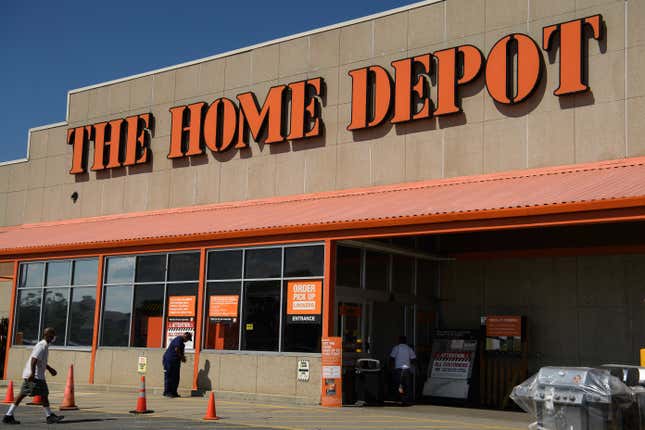
A coalition of Black faith leaders across Georgia are calling for a boycott of Home Depot in response to the corporation’s lack of urgency to pressure Republicans in the state to reverse its anti-Democratic voter suppression laws.
Leading the charge is Bishop Reginald T. Jackson, who oversees all 534 African Methodist Episcopal churches in Georgia.
“We don’t believe this is simply a political matter,” Bishop Jackson told the New York Times. “This is a matter that deals with securing the future of this democracy, and the greatest right in this democracy is the right to vote.”
More than 1000 churches of various denominations in the state are supporting the boycott, which organizers say is a “warning shot” at Home Depot. The hardware company is based in Georgia and is one of the state’s largest employers.
The issue faith leaders have with the company is that its response to the recently passed anti-voter laws in the state wasn’t as forceful as the reactions of Coca Cola, Delta and other corporations headquartered in the state. Those companies also responded with lukewarm statements until activists shamed them into stronger stands, as The Root previously reported.
In March, Gov. Brian Kemp signed into law a very repressive bill that makes the process of voting exponentially harder and makes it easier to throw out what otherwise are legitimate ballots.
According to The Times, here are a few bullet points of what the bill does:
Voters will now have less time to request absentee ballots.
- There are strict new ID requirements for absentee ballots.
- It’s now illegal for election officials to mail out absentee ballot applications to all voters.
- Drop boxes still exist … but barely.
- Mobile voting centers (think an R.V. where you can vote) are essentially banned.
- Early voting is expanded in a lot of small counties, but probably not in more populous ones.
- Offering food or water to voters waiting in line now risks misdemeanor charges.
- If you go to the wrong polling place, it will be (even) harder to vote.
- If election problems arise, a common occurrence, it is now more difficult to extend voting hours.
- With a mix of changes to vote-counting, high-turnout elections will probably mean a long wait for results.
- Election officials can no longer accept third-party funding (a measure that nods to right-wing conspiracy theories).
- With an eye toward voter fraud, the state attorney general will manage an election hotline.
- The Republican-controlled legislature has more control over the State Election Board.
- The secretary of state is removed as a voting member of the State Election Board.
- The G.O.P.-led legislature is empowered to suspend county election officials.
- Runoff elections will happen faster — and could become harder to manage.
Home Depot executives have not said much about the anti-voter bills, but Arthur Blank, one of the company’s founders, said in a call with other business executives this month that he supported voting rights. Ken Langone, another founder, is a well-known supporter of Donald J. Trump. Trump’s false claims of voter fraud inspired many of the nation’s anti-voter laws passed in GOP-lead states.
Rev. Timothy McDonald III, senior pastor of First Iconium Baptist Church and founder of the African American Ministers Leadership Council, is helping to organize the boycott and said that Home Depot isn’t the only corporate target.
“It definitely will not end with Home Depot,” he said to The Atlanta Journal-Constitution. “We may call other names. We are giving them a chance to get their act together.”

